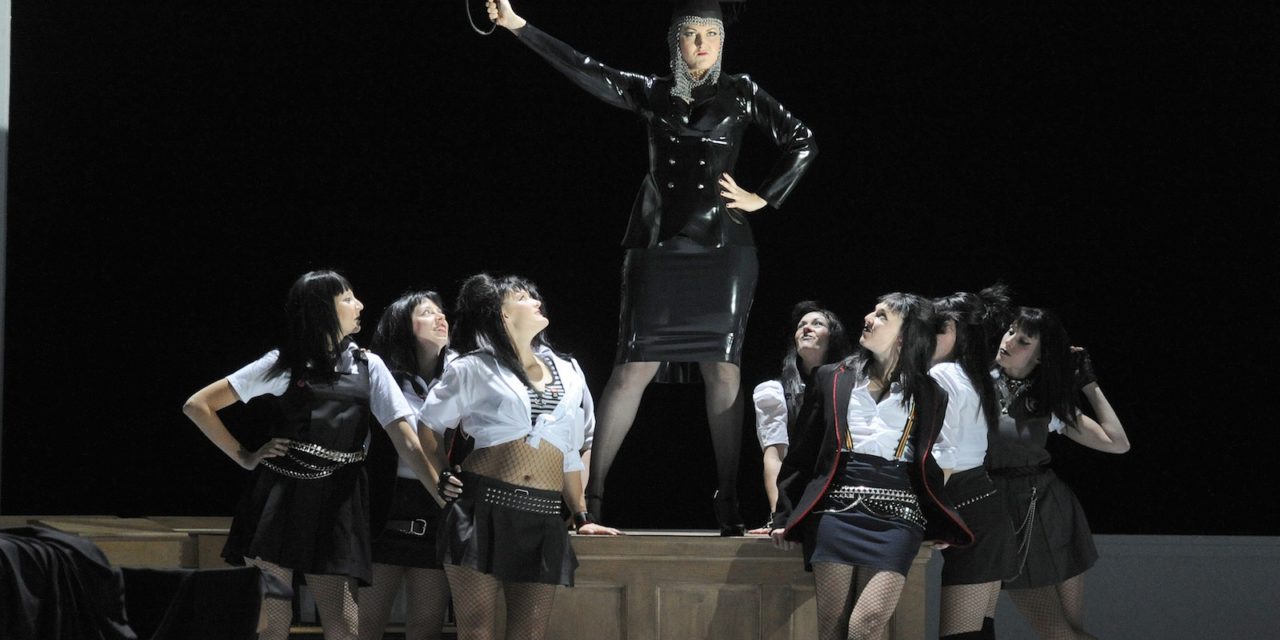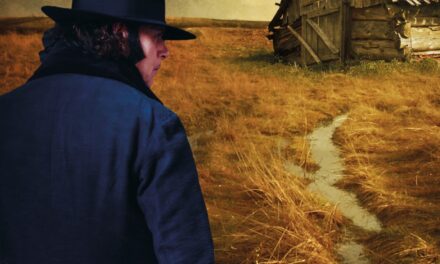It’s opera, captain, but not as we know it! Armida (Jacquelyn Stucker) and Furies in Rinaldo by Glyndebourne
L’elisir d’amore
You will recognise the melodies, many of them, even if like me you have never seen this opera before today.
Donizetti’s L’elisir d’amore is one of the three Glyndebourne offerings at Norwich Theatre Royal this week. Opera often brings us tales of bloodthirsty drama and violent conflict, but a few of the classical Italian opera canon offer us the lighter and more romantic side of life and this is one of the best. Grim times deserve distraction and this is the perfect antidote to the chaos promised by those who currently consider themselves our rulers.
The synopsis describes Nemorino (Sehoon Moon) as a love-sick peasant, which dismissal matches that from the object of his relentless devotion, Adina (Benedetta Torre). She is a young girl possessed of supreme self confidence and a slightly capricious way with the suitors who present themselves. Adina teases Nemorino unmercifully, but he remains fixated upon capturing her heart.
When the soldiers march in to town Sergeant Belcore (Matthew Durkan) promptly decides that Adina is the one he will marry, and she plays along if only to further tease the hapless Nemorino. He meanwhile seeks a solution to his woes from quack elixir-purveying Dr Dulcamara (Misha Kiria) who has rolled into town with his miming sidekick (Maxime Nourissat). Nemorino buys the fake elixir and thinks this will sort his love issues out. Life is never that easy.
A Glyndebourne production comes with high expectations of the quality of orchestra, performers, set and direction and this will not disappoint. But this is a production that adds much, with an intriguing diagonal set teetering over the pit and and many added details that make this a charming show. The principals are without exception superb, particularly the romantic duo who lead, and give us memorable versions of the Donizetti arias. But the unexpected star of the show does not sing a note, yet adds a huge amount of pathos, drama and even slapstick to the proceedings. Maxime Nourissat is hardly credited in the programme, but his relentless mime takes this from a good to an exceptional performance, no mean feat when you are in an opera and do not sing a note.
This was the first night of a week of Glyndebourne on tour in Norwich, and was a fine start to a memorable week of opera.
Rigoletto
The second offer is a rather surreal re-working of Verdi favourite Rigoletto. It shares with L’elisir d’amore the concept of introducing a non-singing extra character. Set in the world of 1920s Hollywood production the extra appears to be the ghost of Charlie Chaplin – or is it the ghost of Rigoletto himself? Rigoletto is performed by the admirable baritone Nikoloz Lagvilava who in a curious twist of casting fate looks more like Peter Lorre than Charlie Chaplin.
In the original Rigoletto is the hunchback jester to the philandering Duke of Mantua (Matteo Lippi) who relentlessly pokes fun at the courtiers, particularly when their wives or daughters are being bedded by the Duke. However Count Monterone (Aubrey Allicock) takes offence at Rigoletto’s japes and puts a curse on him after his daughter is used by the Duke. In this Glyndebourne production the drama is heightened by the daughter confronting the Duke with the product of their union, then committing suicide at his rejection. We immediately move forward 17 years and Rigoletto has the charge of a daughter he is devoted to, and we are by hints invited to consider that this girl, Gilda (Vuvu Mpofu) may be the abandoned infant. The daughter is kept closeted away, yet still manages to be seduced herself after encountering the Duke at Sunday prayers where he pretends to be an impoverished student. This potential incest makes the story even darker than Verdi’s tragic original tale.
Rigoletto meanwhile is offered the services of a wonderfully named hit-man Sparafucile (Oleg Budaratskiy). He declines but retains an option of future employment of the killer.
Rigoletto discovers that the Duke has become Gilda’s lover, and is enraged, while Gilda herself is kidnapped by the courtiers who think she is Rigoletto’s hidden mistress, not his daughter. Upon reuniting with her Rigoletto shows her the Duke busy wooing another woman to show his constant infidelity, and urges her to dress like a boy and head off to safety in the countryside. Instead, hearing of her father’s plot to get the Duke killed she rushes to the scene of the proposed execution to save him, and becomes the victim of the murder herself by means of a rather far fetched substitution. The Duke meanwhile from high in the building sings the perennially favourite aria “La Donna è mobile” – woman is fickle. Rigoletto recognises the voice of the duke just as he is supposed to be casting his wrapped body into the river, and unwrapping the bundle is shocked to discover his dying daughter who revives just enough to declare that she is happy to die for her beloved Duke. It is fair to say that Rigoletto is more than a bit miffed at this point, as Monterone’s curse has brought down the one good thing in his life.
The three principal singing roles Rigoletto, Gilda and the Duke are superbly performed with the impressive support of the large Glyndebourne chorus and orchestra conducted by Thomas Blunt. Nikoloz Lagvilava gives us fine and memorable rendition of the troubled Rigoletto, the man forced to be jolly and witty regardless of his growing inner turmoil and despair. Vuvu Mpofu is delightful and accomplished as Gilda, desperately trying to end the murderous tension between father and lover, while Tenor Matteo Lippi effortlessly masters a role made familiar to us by many of the world’s most famous tenors. His acting fits perfectly the womanising film director of the pre-#MeToo Hollywood that Director Christiane Lutz has picked to replace the original ducal court.
Does this bold new Rigoletto re-set work? Difficult to answer, but I guess it depends on the extent to which you wish to suspend your disbelief, and if you are paying good money to see opera you are already a long way down that road. The new setting does not fit the detail of the original libretto, but it does permit Director Lutz to add an electrifying new twist to give a context to the actions of Rigoletto with regard to his daughter which gives an urgency to his need to prevent the consummation of daughter and Duke well beyond the mere conventions of morality then prevalent. There are themes and visual distractions (including a fashionable amount of projections) which pop up from time to time but the pathos of the original Verdi masterpiece remains overwhelming as Rigoletto suffers never-ending depradations, while the Duke thoughtlessly continues to seduce and ruin a succession of young women who fall for his fibs. The parallels with current events are uncomfortably plain.
Rinaldo
Glyndebourne having built our excitement up with the first two works takes us to a new peak with their interpretation of Rinaldo in this dramatic version first aged in 2011. At last I have a handle on Handel, a composer I have previously found difficult to relate to. The company have taken one of the oldest works of opera, first performed in 1711, and given it a bold new setting that draws on St Trinian style school capers and some delightfully fetishistic costume and movement. Handel set the action in the time of the First Crusade in Jerusalem in 1099, but we now see it as the fantasy of a bullied schoolboy transmogrified into the valiant hero and lover Rinaldo.
The male singers are mostly countertenors, singing roles in impossibly high register that were mostly originally intended for castrati. With extensive coloratura echoed by the orchestration this opera has wonderfully complex sounds that elucidate emotion well even if at the expense of slowing down the action to the pace of the lengthiest of slow motion replays. A late battle scene uses this exact image to substitute a bloody battlefield with an achingly slow football game.
Young Rinaldo (brilliantly sung by Jake Arditti) moves quickly from bullied schoolboy to crusade hero, spurred on by his love for Almirena (Madison Nonoa). Under the leadership of Goffredo (James Hall) he joins the attack on Argante (bass Aubrey Allicock) and his partner Armida (Jacquelyn Stucker) who is dressed in a black latex frock and leads the troop of hells’ furies that started out as innocent if rather scantily dressed schoolgirls. Armida captures Almirena as a hostage to provoke Rinaldo, then further complications arise when Argante falls for Almirena and Armida for Rinaldo. Needless to say our virtuous Christian home team remain valiantly faithful to their true partners, while Handel got in early on the current establishment drift towards Islamophobia.
Every scene in this production has its own ‘wow’ factor with startling design and enticing costumes. My particular favourite is when the schoolyard cycle rack becomes the stable for the mighty steeds that carry the men into battle – with genuine Pashley bicycles made in Stratford on Avon adding both humour and great efficacy to the battle charge.
This production really is great fun but the music is breathtaking too. The complex Handel score is enhanced not undermined by the staging, and all the leads are top class singers too. James Hall’s Goffredo hits the highest of notes confidently in a role often given to a female cross-dressed singer. Armida dominates the stage whenever she is on it, occasionally snapping her rubber frock in place should we not be paying enough attention. A special credit must go to Madison Nonoa giving a first-class performance as Almirena after stepping in at short notice as an understudy. She was rightly given personal applause by conductor David Bates at the curtain call and gave us a romantic lead we could not fail to fall in love with.
A visit from the Glyndebourne company always brings the very best to the Norwich Theatre Royal stage, and I cannot wait to see what delights will flutter on to the Norwich stage on their next eagerly anticipated visit.
© Julian Swainson 2019
Read more here: https://www.glyndebourne.com





Recent Comments